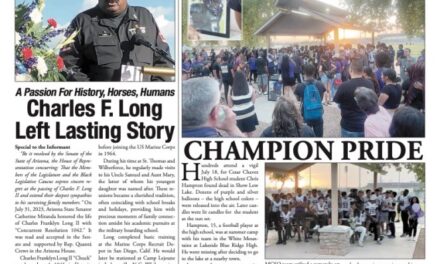By Ryan Coleman,
President Randallstown Branch NAACP,
Special to the AFRO
Regionalism is the idea that cities and counties should work with their neighbors as a unit that thrives from collective strengths. The reasons for thinking about regionalism are strong and compelling. The motivation for regionalism comes from both problems and opportunities.
Many of the problems are already apparent: crime, education, environmental and economic development. Criminals are not limited by political boundaries. Efforts to reduce crime shouldn’t be either. The failures of the Baltimore City Schools have a direct impact on the quality of the workforce available to employers throughout the region. Environmental quality and the threats to it have nothing to do with jurisdictional lines on a map. Research shows economic prosperity and growth are less in regions with declining central cities like Baltimore.
Let’s talk about some of the strengths:
Cooperation Across Governments: Many issues, such as air pollution, traffic congestion and affordable housing, structural racism cut across municipal boundaries. They require regional solutions, such as linking the unemployed or underemployed persons from inner cities and disadvantaged suburbs to dynamic centers of job growth in the region is crucial to successful workforce development policies. Focusing on interrupting structural racism, poverty and the wealth gap through diversity, loan forgiveness, equal pay, grants, housing incentives, baby bonds and reparations could be pushed by cooperating governments.
Collaboration Across Sectors: Collaboration among public, private and nonprofit actors can increase the effectiveness of policies. In effect, nonprofit and private organizations can coproduce policies, thereby making them more responsive and cost effective.
Former County Executive Dutch Ruppersberger and former Mayor Kurt Schmoke both had a strong regional approach. They would make a point to tour major cities together, wooing businesses to come to Baltimore City and Baltimore County. These companies would be so impressed by the strong regional support and approach. They further looked at jointly how to revitalize Liberty Heights and Liberty Road. This approach could have turned around the food deserts, the disinvestment and the deterioration of the business sectors on Liberty Road and Randallstown.

The Randallstown NAACP encourages municipalities to look beyond their boundaries and recognize that working together towards the betterment of the entire Baltimore area will ultimately prove beneficial to each locality within it. This notion is not unlike the principals of our global economy—with impacts on one nation likely having resulting impacts on others. By embracing this forward-thinking way of conducting business, the Baltimore area is better equipped to accomplish goals that will strengthen our economy and enhance our quality of life.
The City of Baltimore will continue to be more isolated, dying and withering alone. Together we can create a better future – that we can have greater impact and ensure our resources are put to best use by combining our efforts and making a stronger region.
The question is do city leaders believe in regionalism. Baltimore leaders would do well to recall the words of sixteenth-century political theorist Niccolo Machiavelli, who talked about regionalism:
“It must be considered that there is nothing more difficult to carry out, nor more doubtful of success, nor more dangerous to handle, than to initiate a new order of things. For the reformer has enemies in all those who profit by the old order and only lukewarm defenders in all those who would benefit by the new order, this lukewarmness arising partly from fear of their adversaries, who have the laws in their favor; and partly from the incredulity of mankind, who do not truly believe in anything new until they have had actual experience of it.”
Ryan Coleman is the President of the Randallstown branch of the NAACP. He can be reached at randallstownnaacp@gmail.com.
The post Regionalism: don’t be scared to work across boundaries appeared first on AFRO American Newspapers .











